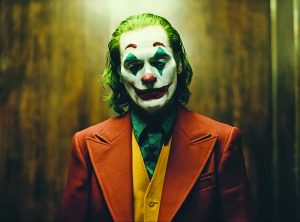‘Joker’ movie unsettles media and pleases audiences

“Joker” tells the troubled tale of Arthur Fleck and how the society he lives in plunges him into insanity. Photo by The Sun
By Jack Murphy
Staff Writer
Acclaimed actor Joaquin Phoenix stars as the titular ‘”oker” in Hangover director Todd Philips’s latest production. The film follows the man before he became the Joker and who he was before in life, something that has never been explored in film before. Before I go deeper into my thoughts on the film itself, it is necessary to examine the media’s response to this movie.
The mainstream media shoved a narrative down everyone’s throats. Outlets from CNN to Fox News raised baseless alarm that it would cause a mass shooting and that this movie is irresponsible. The first part of this that is laughable is that they continue to allege that movies, books, video games or any form of media cause mass shootings.
Many researchers, such as Professor Patrick Markey of Villanova University, have found no connection between violent entertainment and real-world violence. Those who claim a causal link are just looking to scapegoat whatever form of media they have an agenda against. This is not new, and it has always been one of the topics that infuriates me.
“Joker” is just another chapter of many to come in a nonsensical debate.
The second problem with the media’s response to “Joker” is that it asserts the movie will cause mass shootings. Outlets like “Vice” and “Vox” released several articles accusing the film of supporting white nationalism and gun violence. The racial assertions are baseless, and the concerns about gun violence are merely deflection. There is a wealth of research indicating that the news media, not the entertainment industry, is responsible for promoting mass shootings.
A paper published by the Institute of Labor Economics found that mass media coverage directly causes more mass shootings to occur by encouraging a copycat effect. News outlets post the shooter’s face and dedicate hours of coverage to the perpetrator’s life story. This makes the shooter a celebrity, inspiring others who crave the attention to commit a shooting as well.
The news media has failed in its goal of sabotaging the movie. “Joker” has broken countless October box office records. But enough about the mainstream media. It is time to discuss why “Joker” is the second-best film I have seen during my time with the Campus Chronicle.
When a solo Joker movie was announced, I was interested to see how it would turn out. Phoenix is, and has been, one of the best actors working today. I wondered how he would portray the character after both Heath Ledger set the bar so high in “The Dark Knight” and Jared Leto set the bar so low in “Suicide Squad.”
Phoenix manages to soar like Ledger did, creating his interpretation of the character and giving an Oscar-worthy performance that left me in awe the entire time he was on screen. Unlike Ledger’s performance, in which he’s the Joker the entire film, Phoenix has to play two characters. Arthur Flank is a lonely, mentally-ill man that experiences one of the worst lives one could live, while the Joker is a psychopathic killer that has nothing to lose and all the confidence in the world. Not only is he incredible as both characters, but the best part of his performance is the believable transformation that takes place throughout the second act of the film.
“Joker” is heavily inspired by the two Martin Scorsese films, “Taxi Driver” and “The King of Comedy.” It is not a subtle inspiration either. The plot of “Joker” parallels “The King of Comedy.” Robert De Niro plays a crucial role as the talk show host Murray Franklin, an inspiration of Flank throughout the film. This makes it interesting that De Niro played the lead roles in both “Taxi Driver” and “A King of Comedy.”
“Joker” does not play anything subtle, which is a detriment to some, but a positive to others. The film has two obvious themes. First is that mental health problems are critical and should be taken more seriously, and the second is the divide in today’s society between the upper and lower class.
Phillips’s depiction of Gotham is the dirtiest city of all time. It gives off gross vibes and everyone looks depressed. It is as if someone filled the New York City from “I Am Legend” with people. It is no wonder people are pissed off in Gotham because their lives, like Arthur’s, are awful. This causes the city to grow chaotic as the story unravels.
The music of the film is something that one cannot ignore. Hildur Guðnadóttir, the same composer who did “Chernobyl,” did an excellent job. The score in “Joker” is haunting. It fits the film perfectly and sets the tone so well that I could not give it any more acclaim.
The only issue I have with “Joker” is its connection to the Batman universe. While I think the use of Gotham, Thomas Wayne, and the Joker character are phenomenal, I do not believe that anything involving young Bruce Wayne needed to be in the film, and a particular spoiler in the final 10 minutes of the movie involving the Wayne’s was so unnecessary that it brought me out of the film for a bit. How- ever, he is not featured that prominently in the film, which is a saving grace.
“Joker” is a must-see cinematic experience that I recommend everyone check out. It doesn’t matter if you dislike comic-book movies. This is not a superhero movie, but an excellent character study that is worth the price of admission. Phoenix is amazing, the direction is great, the entire cast gives great performances and the music is phenomenal. I give “Joker” an A.